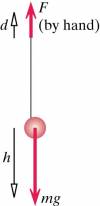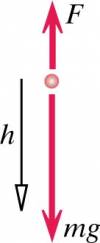This is an old revision of the document!
Example: A Yo-yo
You're playing with a yo-yo of mass m on a low-mass string (See Diagram in Representations). You pull up on the string with a force of magnitude F, and your hand moves up a distance d. During this time the mass falls a distance h (and some of the string reels off the yo-yo's axle).
(a) What is the change in translational kinetic energy of the yo-yo?
(b) What is the change in the rotational kinetic energy of the yo-yo, which spins faster?
Facts
a:
Initial State: Point particle with initial translational kinetic energy
Final State: Point particle with final translational kinetic energy
b:
Initial State: Initial rotational and translational kinetic energy
Final State: Final rotational and translational kinetic energy
Assumptions and Approximations
You are able to maintain constant force when pulling up on yo-yo
Assume no slipping of string around the axle. Spindle turns the same amount as string that has unravelled
No wobble included
String has no mass
Lacking
Change in translational kinetic energy of the yo-yo
Change in the rotational kinetic energy of the yo-yo
Representations
a:
Point Particle System
System: Point particle of mass $m$
Surroundings: Earth and hand
b:
Real system
System: Mass and string
Surroundings: Earth and hand
$\Delta K_{trans}$ = $\int_i^f \vec{F}_{net} \cdot d\vec{r}_{cm}$
Solution
a:
From the Energy Principle (point particle only has $K_{trans}$):
$\Delta K_{trans} = (F - mg)\Delta y_{CM}$
$\Delta y_{CM} = -h (from\; digram)$
$\Delta K_{trans} = (F - mg)(-h) = (mg - F)h$
b:
$\Delta E_{sys} = W_{hand} + W_{Earth}$
$\Delta K_{trans} + \Delta K_{rot} = Fd + (-mg)(-h)$
$\Delta K_{trans} = (mg - F)h$ (From part (a))
$(mg - F)h + \Delta K_{rot} = Fd + mgh$
$\Delta K_{rot} = F(d + h)$

